Just, Kind, and Humble
Several years ago when we came to Richmond, Virginia, for the HEAV convention, we visited the Federal Reserve Bank here and spent some time in their visitor center, after which they gave us a little bag of shredded money. That’s what happens to money when it gets too old to be useful.
After we toured the Federal Reserve, we took a little walk out back and enjoyed seeing the canal. When our friend Wanda and I were making plans for our sightseeing on Wednesday, she brought up the idea of a canal ride. I had no idea you could do that. We jumped at the chance.
Our boat driver and guide was Charles. He obviously loved his job, and he was a great storyteller. He told his stories with a passion that said, “These are stories that need to be told.” I agree with him. Charles told us not only about the canal and its history. He shared his own history, too.
Charles’ mother died when he was about three years old. His grandmother took care of him until he was eight. That is when he entered an orphanage and became the first African American male resident in its long history. Charles lived there in a cottage with twelve boys until he was eighteen.
Charles surprised me when he told us who thought of building the canal at Richmond — none other than George Washington! Having a canal brought great economic benefits to the area. It became part of a network that made it possible to transport goods from Chesapeake Bay all the way to St. Louis.
As we traveled in our motorized canal boat to this drawbridge, . . .
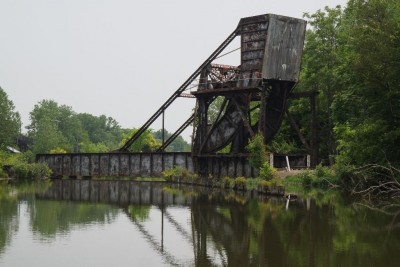
. . . a manmade wonder which was raised using weights and horsepower (from real horses), we saw creations that God made.
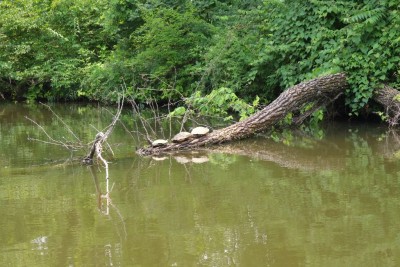
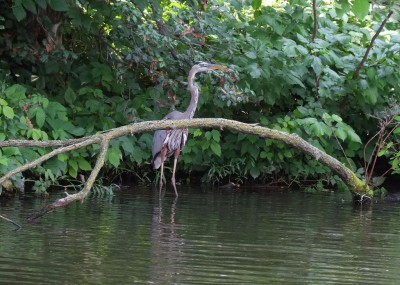
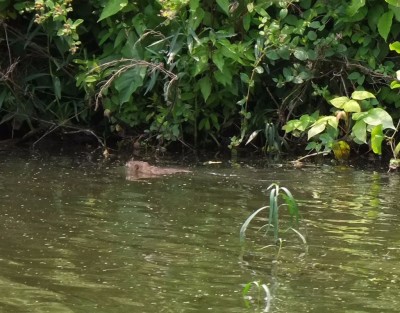
As we neared the drawbridge, Charles told us about the thousands and thousands and thousands and thousands (that’s how he expressed it) of slaves who were unloaded in that very area to be sold to plantations further south.
As we headed back to where our tour began, Charles told us stories about Richmond when it was capital of the Confederacy during the Civil War. He told us of the day when Jefferson Davis received a message from General Robert E. Lee, telling him that he could no longer defend Richmond. Davis ordered everyone — all 300,000-plus residents — to evacuate the city and commanded that it be burned when they left.
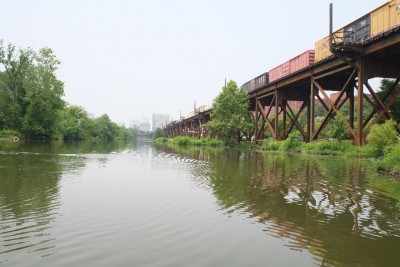
Charles continued to tell the story of Davis until he was captured in Georgia. According to what we hear from our local historians, Mounce Lauderdale Gore was one of the guards who was with Davis at his capture. Gore was the owner of the farm where we live, and he is buried in the cemetery behind our house.
In between our tour of St. John’s Church and the canal ride, Wanda treated us to a picnic lunch on Libby Hill. As we sat overlooking the James River, we talked about this and that. In light of some of the sad events of the last few months in places like Ferguson, Missouri, and Baltimore, Maryland, Ray asked Wanda about race relations in Richmond.
I just finished listening to Up from Slavery by Booker T. Washington, in which Washington tells of his rise from a slave cabin in Virginia to becoming the founder and president of Tuskegee Institute, which became Tuskegee University.
As a side note, Tuskegee University produced the famed Tuskegee airmen who became heroes in World War II. Two men who have played prominent roles in encouraging Dr. Ben Carson to run for president are John Philip Sousa IV, great-grandson of composer John Philip Sousa, and Vernon Robinson, whose father V. L. Robinson Jr, was a Tuskegee airman.
At St. John’s Church, we learned about Patrick Henry who wanted liberty. On Libby Hill, we talked about equality for everyone. On the canal, an African American told us about the slave trade and the end of the Civil War.
Then we went to the Tredegar Iron Works National Park Service site, where weapons and ammunition were produced for the Confederacy. Out back we found this monument of President Lincoln and his son Tad with the words: “TO BIND UP THE NATION’S WOUNDS” — a fitting end to a day that was fun, but that gave us much to ponder.
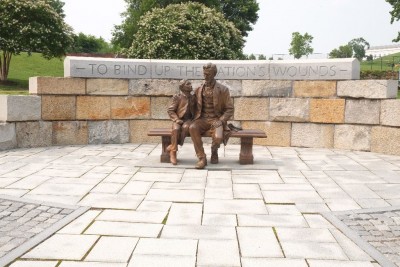
He has told you, O man, what is good;
And what does the Lord require of you
But to do justice, to love kindness,
And to walk humbly with your God?
Micah 6:8


That bird is a blue heron. We see them here almost everyday!
Oh, how wonderful. We see blue herons rarely in our river but no the Great Blue ones.
Your waterbird appears to be a great blue heron =) . Thank you for the beautiful pictures and poignant thoughts. I never delete your emailed post without reading it first. Blessings!
Thank you, Kristin. That makes me feel very, very good.